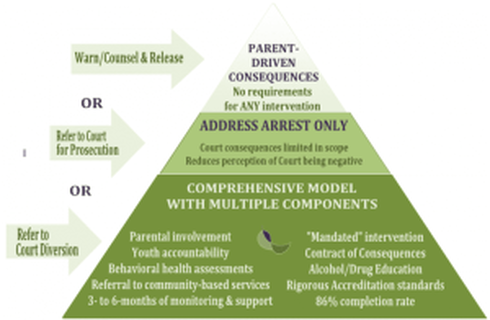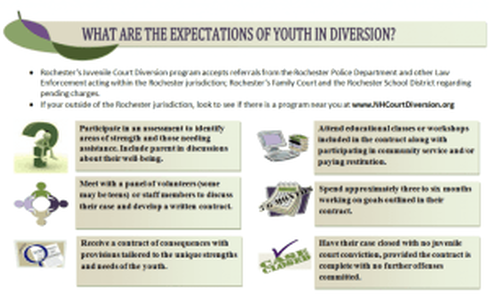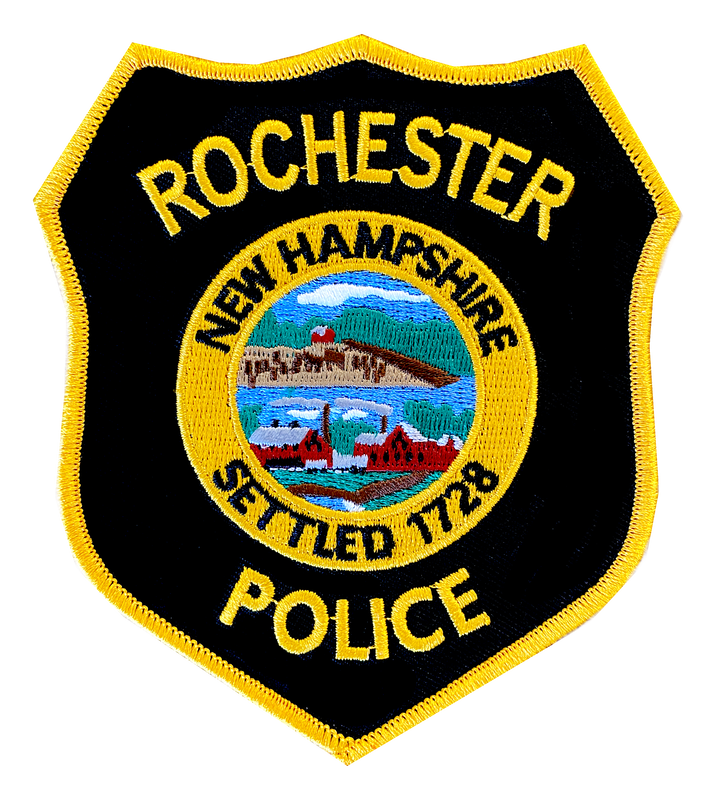Juvenile Services
So What is Juvenile Court Diversion?
Court Diversion is a community-based alternative to the formal court process that integrates restorative justice practices, promotes positive youth development, and reduces juvenile crime and recidivism. Diversion programs recognize that you made a mistake. The program gives you the opportunity to take responsibility for and learn from your mistakes without ending up with a juvenile court record.
This option is offered to first-time offenders with a misdemeanor level charge under the age of 18, within the Rochester Police Department’s jurisdiction. You must be willing to take full responsibility for the offense and do not contest the facts of the police report.
What are the Benefits of Juvenile Court Diversion?
Court Diversion is a community-based alternative to the formal court process that integrates restorative justice practices, promotes positive youth development, and reduces juvenile crime and recidivism. Diversion programs recognize that you made a mistake. The program gives you the opportunity to take responsibility for and learn from your mistakes without ending up with a juvenile court record.
This option is offered to first-time offenders with a misdemeanor level charge under the age of 18, within the Rochester Police Department’s jurisdiction. You must be willing to take full responsibility for the offense and do not contest the facts of the police report.
What are the Benefits of Juvenile Court Diversion?
Frequently Asked Questions
Please note this is an attempt to answer your questions, but a phone call can help alleviate any confusion. Contact RPD Dispatch and ask for someone in Juvenile Services at (603) 330-7128.
Q. If my child is arrested or charged with a delinquency, do they have to make bail?
A. No. After a juvenile is charged with an offense, he or she is released to a parent or guardian. If a parent or guardian is unavailable the juvenile will be released into the custody of the Department of Health & Human Services for placement into a foster home, (RSA 169-C,xiii) a crisis home, a shelter care facility, a group home or a substance treatment center certified for juveniles.
If a parent/guardian is available but the State feels that in order to protect the personal safety or property of others from the probability of serious bodily harm or other harm than a judge is contacted and a determination is made to place the juvenile at home or in shelter care or if the crime/threat is serious enough at Sununu Youth Services (SYSC) center in Manchester.
The Rochester Police Department is required to complete a Juvenile Detention Assessment. A Judge will make the final determination if the juvenile should be removed from the home temporarily for the safety of both the juvenile and the community.
There will be an emergency arraignment the following day provided it is not a weekend or holiday.
Q. What is the difference between a delinquent and a CHINS (Child in Need of Services) offender?
A. A delinquent is any person under the age of 18 who commits any act that would constitute a felony or a misdemeanor if committed by an adult. A CHINS offender is any person under the age of 18 who commits an offense that would constitute a violation if committed by an adult.
CHINS offenses include charges unique to juveniles. These include Truancy, Runaway, and Stubborn and Unruly Child. These also include all motor vehicle violations if committed by a child under the age of 16. Any violation of the motor vehicle code for individuals 16 years of age and older shall be treated as an adult and the case is handled in District Court with the potential of jail if the State statute dictates. CHINS are handled through the Family Court System and can be filed in Dover at the Courthouse by a parent, school official or any law enforcement personnel.
Q. What is the difference between a CHINS and a Juvenile Court Diversion referral?
A. A CHINS is the entry point into the juvenile justice system for any violation level offense such as runaways or truancy. The entry point for first time offenders with delinquency charges, according to NH RSA 169 B:10 is juvenile court diversion. This is a pre-court option provided to all first-time misdemeanor level offenders that is based on restorative justice and handled through the Department rather than the Court system.
Q. I was served paperwork indicating my child was being charged with an offense, what can I expect to occur?
A. Juveniles are charged with a document called a juvenile petition. The petition is similar to a complaint in the adult system, but is subject to different time constraints. A juvenile petition must be served to a parent no sooner then 7 days before the hearing, no later then 24 hours before the hearing date.
Once the juvenile is arraigned on either a delinquent or CHINS offense, the juvenile must have a trial within 30 days of the date of arraignment (21 days if the juvenile is being held in placement or at SYSC). A juvenile has the same rights in court as an adult. A juvenile has a right to an attorney if they choose to have one. In addition, if a juvenile is coded in the school system, such as with an Individualized Education Plan (IEP) or a 504 plan, or if they have a diagnosed disability, they MUST have an attorney assigned to them. Generally a court appointed attorney will be assigned to the juvenile, but a parent can a private attorney to represent their child.
In the juvenile system, the language is slightly different. Instead of the terms “guilty” and “not guilty”, the juvenile has the option of pleading “true” or “not true”.
Q. Who can I call if my child is missing?
A. Reports of a missing child are made to your local police department. Be prepared to give a photo of your child to the officer taking the report and a full description. An officer may also ask for a birth certificate. If the child is not apprehended after 30 days, an officer will also ask for a copy of the juvenile’s dental records. The missing youth is then put out through N.C.I.C (National Crime Information Center). Upon return of the youth, he/she is cancelled on the computer as missing. Again, missing persons are considered CHINS offenses, therefore once a missing youth is located, he/she cannot be locked up in a secured cell unless the youth is charged with a criminal (delinquent) act. Most importantly, parents/guardians need to cooperate and work with Law Enforcement.
Q. If I think a child is being abused, am I obligated to contact someone and if so, whom should I call?
A. A person is in violation of RSA 169-C:29 if he or she fails to report his or her suspicions that a child is or has been abused or neglected. Reports of abuse can be made to the Division of Children, Youth and Families (800-894-5533) or to your local police department (911). Police departments are often notified during non-business hours and weekends.
Q. What can I expect from the Juvenile Division if I am the victim of a juvenile act?
A. All cases involving juveniles are reviewed and considered for assignment to one of the detectives who handle juvenile crime. Cases are naturally prioritized from serious to less serious. Serious crimes against persons and/or if there is a risk that the suspect will flee and commit additional crimes take precedent over other cases. You can expect the Detective assigned to your case to interview the suspect and any witnesses you may have listed, or witnesses the Detective may have identified. Be prepared to be patient and understand that juvenile matters are very confidential – despite recent legislation allowing victim input in the most serious cases.
Q. Can I have my child emancipated as an adult in NH?
A. No. There is no emancipation law in the state of New Hampshire. The age of minority for criminal offenses is 18 in the State of New Hampshire. For child services, the age remains under 18 years old. A child can only go to adult court if he/she commits a motor vehicle or aeronautical violation upon reaching 16 years old, or a tobacco related offense once he/she has turned 12 years old.
These are similar to being issued a traffic ticket. Juveniles may be “certified” as adults through the court system, but only after certain criteria directly related to a particular criminal offense or offenses have been met. In other words, parents or youth cannot say that they want their child to become emancipated because they can no longer control them or want nothing further to do with them.
Services regarding behaviors amounting to CHINS offenses (runaway, stubborn and unruly etc.) may be obtained by the Family Court in Dover.
Q. How can I keep my child safe from internet predators?
A. The New Hampshire Department of Justice is committed to:
There are also special computer programs available to parents that can safeguard your home computer when you are not monitoring your youth’s access. McGruff SAFEGUARD is not your typical website blocking service, to find out more click: McGruff Safeguard
Here are some local resources to help:
Q. What do I do if I think my child is involved in a gang?
Q. What is Graffiti?
Q. If my child is arrested or charged with a delinquency, do they have to make bail?
A. No. After a juvenile is charged with an offense, he or she is released to a parent or guardian. If a parent or guardian is unavailable the juvenile will be released into the custody of the Department of Health & Human Services for placement into a foster home, (RSA 169-C,xiii) a crisis home, a shelter care facility, a group home or a substance treatment center certified for juveniles.
If a parent/guardian is available but the State feels that in order to protect the personal safety or property of others from the probability of serious bodily harm or other harm than a judge is contacted and a determination is made to place the juvenile at home or in shelter care or if the crime/threat is serious enough at Sununu Youth Services (SYSC) center in Manchester.
The Rochester Police Department is required to complete a Juvenile Detention Assessment. A Judge will make the final determination if the juvenile should be removed from the home temporarily for the safety of both the juvenile and the community.
There will be an emergency arraignment the following day provided it is not a weekend or holiday.
Q. What is the difference between a delinquent and a CHINS (Child in Need of Services) offender?
A. A delinquent is any person under the age of 18 who commits any act that would constitute a felony or a misdemeanor if committed by an adult. A CHINS offender is any person under the age of 18 who commits an offense that would constitute a violation if committed by an adult.
CHINS offenses include charges unique to juveniles. These include Truancy, Runaway, and Stubborn and Unruly Child. These also include all motor vehicle violations if committed by a child under the age of 16. Any violation of the motor vehicle code for individuals 16 years of age and older shall be treated as an adult and the case is handled in District Court with the potential of jail if the State statute dictates. CHINS are handled through the Family Court System and can be filed in Dover at the Courthouse by a parent, school official or any law enforcement personnel.
Q. What is the difference between a CHINS and a Juvenile Court Diversion referral?
A. A CHINS is the entry point into the juvenile justice system for any violation level offense such as runaways or truancy. The entry point for first time offenders with delinquency charges, according to NH RSA 169 B:10 is juvenile court diversion. This is a pre-court option provided to all first-time misdemeanor level offenders that is based on restorative justice and handled through the Department rather than the Court system.
Q. I was served paperwork indicating my child was being charged with an offense, what can I expect to occur?
A. Juveniles are charged with a document called a juvenile petition. The petition is similar to a complaint in the adult system, but is subject to different time constraints. A juvenile petition must be served to a parent no sooner then 7 days before the hearing, no later then 24 hours before the hearing date.
Once the juvenile is arraigned on either a delinquent or CHINS offense, the juvenile must have a trial within 30 days of the date of arraignment (21 days if the juvenile is being held in placement or at SYSC). A juvenile has the same rights in court as an adult. A juvenile has a right to an attorney if they choose to have one. In addition, if a juvenile is coded in the school system, such as with an Individualized Education Plan (IEP) or a 504 plan, or if they have a diagnosed disability, they MUST have an attorney assigned to them. Generally a court appointed attorney will be assigned to the juvenile, but a parent can a private attorney to represent their child.
In the juvenile system, the language is slightly different. Instead of the terms “guilty” and “not guilty”, the juvenile has the option of pleading “true” or “not true”.
Q. Who can I call if my child is missing?
A. Reports of a missing child are made to your local police department. Be prepared to give a photo of your child to the officer taking the report and a full description. An officer may also ask for a birth certificate. If the child is not apprehended after 30 days, an officer will also ask for a copy of the juvenile’s dental records. The missing youth is then put out through N.C.I.C (National Crime Information Center). Upon return of the youth, he/she is cancelled on the computer as missing. Again, missing persons are considered CHINS offenses, therefore once a missing youth is located, he/she cannot be locked up in a secured cell unless the youth is charged with a criminal (delinquent) act. Most importantly, parents/guardians need to cooperate and work with Law Enforcement.
Q. If I think a child is being abused, am I obligated to contact someone and if so, whom should I call?
A. A person is in violation of RSA 169-C:29 if he or she fails to report his or her suspicions that a child is or has been abused or neglected. Reports of abuse can be made to the Division of Children, Youth and Families (800-894-5533) or to your local police department (911). Police departments are often notified during non-business hours and weekends.
Q. What can I expect from the Juvenile Division if I am the victim of a juvenile act?
A. All cases involving juveniles are reviewed and considered for assignment to one of the detectives who handle juvenile crime. Cases are naturally prioritized from serious to less serious. Serious crimes against persons and/or if there is a risk that the suspect will flee and commit additional crimes take precedent over other cases. You can expect the Detective assigned to your case to interview the suspect and any witnesses you may have listed, or witnesses the Detective may have identified. Be prepared to be patient and understand that juvenile matters are very confidential – despite recent legislation allowing victim input in the most serious cases.
Q. Can I have my child emancipated as an adult in NH?
A. No. There is no emancipation law in the state of New Hampshire. The age of minority for criminal offenses is 18 in the State of New Hampshire. For child services, the age remains under 18 years old. A child can only go to adult court if he/she commits a motor vehicle or aeronautical violation upon reaching 16 years old, or a tobacco related offense once he/she has turned 12 years old.
These are similar to being issued a traffic ticket. Juveniles may be “certified” as adults through the court system, but only after certain criteria directly related to a particular criminal offense or offenses have been met. In other words, parents or youth cannot say that they want their child to become emancipated because they can no longer control them or want nothing further to do with them.
Services regarding behaviors amounting to CHINS offenses (runaway, stubborn and unruly etc.) may be obtained by the Family Court in Dover.
Q. How can I keep my child safe from internet predators?
A. The New Hampshire Department of Justice is committed to:
- Drafting the strongest laws in the nation to protect our children.
- Taking the lead in child-protective law enforcement operations.
- Educating the public on the dangers of the Internet–and helping parents Connect with Their Kids!
There are also special computer programs available to parents that can safeguard your home computer when you are not monitoring your youth’s access. McGruff SAFEGUARD is not your typical website blocking service, to find out more click: McGruff Safeguard
Here are some local resources to help:
Q. What do I do if I think my child is involved in a gang?
Q. What is Graffiti?



